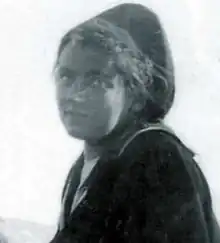
Grace Oakeshott (born Grace Cash, later Joan Reeve; 1872–1929) was a British activist for women's rights who faked her own death in 1907 and emigrated to New Zealand with her lover, Walter Reeve.
Grace Cash was born in 1872.[1] She married Harold Oakeshott and both were active in socialist circles. Grace wrote a paper in 1900 on Women in the Cigar Trade in London, published in The Economic Journal.[2] She was involved in the foundation of the first Trade School for Girls in 1904, and in the Women's Industrial Council.[3]
In 1907 a pile of her clothes was found on a beach in Brittany where she was on holiday, giving the impression that she had drowned. In fact she had made plans to emigrate to New Zealand with her lover Dr Walter Reeve, apparently with the knowledge of her husband, at a time when divorce was difficult and scandalous. The supposed widower, Harold Oakeshott, later married again, bigamously.[3]
In New Zealand Oakeshott used the name Joan Reeve, and had three children with Walter Reeve. She died of multiple sclerosis in 1929 in New Zealand.[3]
Legacy
Oakeshott was the subject of the play Grace, written and directed by her great-granddaughter Sophie Dingemans, which was performed at Wellington's BATS Theatre in 2008.[4]
Her life has been extensively researched by British author Jocelyn Robson, who published Radical Reformers and Respectable Rebels: How the Two Lives of Grace Oakeshott Defined an Era (2016, Palgrave Macmillan ISBN 9781137311832).[3][5]
References
- ↑ Robson, J. (16 June 2016). Radical Reformers and Respectable Rebels: How the Two Lives of Grace Oakeshott Defined an Era. Palgrave Macmillan UK. pp. 17–. ISBN 978-1-137-31184-9.
- ↑ Oakeshott, Grace (1900). "Women in the Cigar Trade in London". The Economic Journal. 10 (40): 562–572. doi:10.1093/ej/10.40.562. JSTOR 2956851.
- 1 2 3 4 Bynum, Helen (17 March 2016). "Radical Reformers and Respectable Rebels: How the Two Lives of Grace Oakeshott Defined an Era, by Jocelyn Robson". Times Higher Education. Archived from the original on 3 May 2016. Retrieved 7 September 2016.
- ↑ "Love story leaves lingering queries". Theatre Review. Retrieved 7 September 2016.
- ↑ "How Grace Oakeshott faked her death in 1907 and fled to New Zealand". Radio New Zealand. 6 April 2016. Retrieved 7 September 2016.